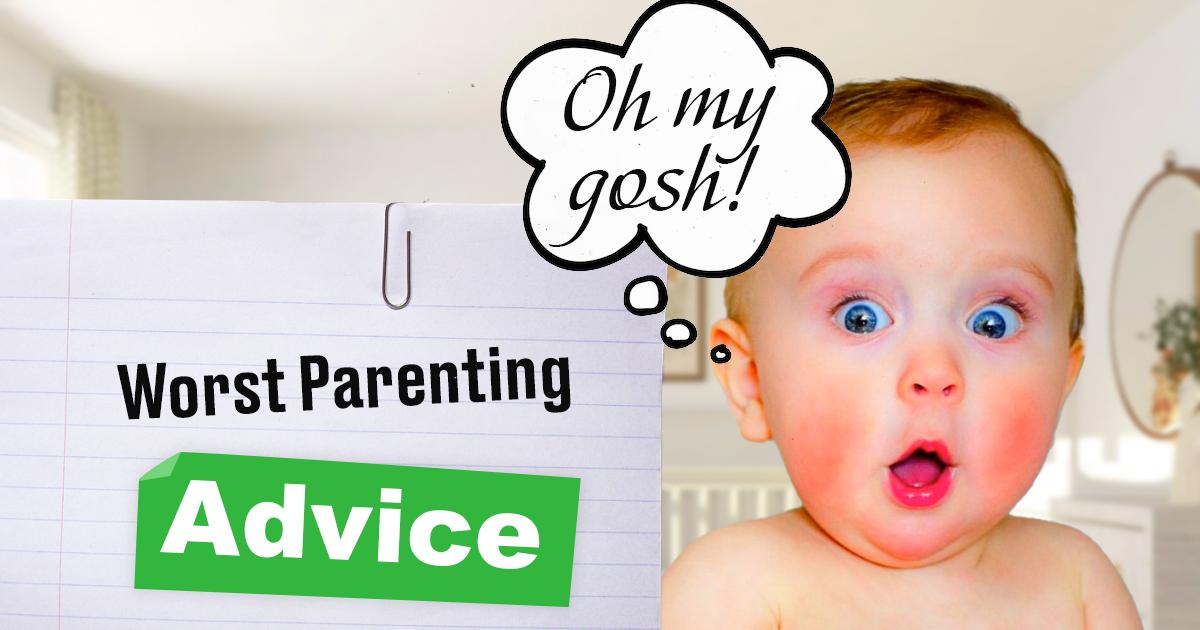The Worst Parenting Advice: Discarding the Myths & Misguidance

Navigating the world of parenting can be overwhelming. Ever since you share the news of your pregnancy, it feels as if everyone is eager to share their advice. Whether it’s your well-meaning neighbor, a random internet article, or even your own family members, it’s easy to get bombarded with tips and tricks on how to raise your child.
But here’s the truth: not all parenting advice is created equal. In fact, a portion of it is simply dreadful. From outdated practices to questionable beliefs, certain pieces of advice should be discarded without a second thought. Following them can lead to unnecessary stress, confusion, and even harm to both you and your child.
So, how can you distinguish between valuable and unfavorable advice? How do you know which advice to follow and which to ignore? In this journey called parenting, it’s important to trust your instincts and think critically about the advice you receive. Keep in mind that there is no universally applicable method for raising children, and what proves effective for one family may not be suitable for another.
In this conversation, we will explore some of the misguided parenting advice that should be disregarded. By shedding light on these misguided notions, we aim to empower you to make informed decisions about your parenting journey. After all, you know your child best, and it’s time to embrace the parenting style that aligns with your values and nurtures the unique individual your child is becoming.
1. “You should sleep when the baby sleeps.”
This classic advice often leaves new parents feeling frustrated and exhausted. It fails to acknowledge the myriad of responsibilities that require their attention when the baby is finally asleep, such as house chores, personal hygiene, or simply taking a moment for themselves.
2. “Don’t pick up your crying baby; you’ll spoil them.”
This old myth perpetuates the idea that responding to a baby’s needs will make them dependent and demanding. However, infants rely on their caregivers for comfort and security. Responding promptly to their cries helps build trust and promotes healthy attachment.
3. “Let your baby cry it out; they need to learn to self-soothe.”
This advice suggests leaving a baby alone to cry for extended periods, under the assumption that it will teach them to calm themselves. However, research shows that responsive parenting and comfort are vital for a child’s emotional well-being and the development of healthy sleep patterns.
4. “Never let your child get bored; provide constant entertainment.”
This notion promotes the idea that children should always be stimulated and engaged, leaving little room for independent play or imagination. However, boredom can be a catalyst for creativity and problem-solving skills. Allowing children to experience moments of boredom encourages self-directed play and fosters their imagination.
5. “You must always have a spotless home to be a good parent.”
This unrealistic expectation places unnecessary pressure on parents to maintain a pristine household while juggling the demands of childcare. The truth is, a little mess is inevitable when raising children and prioritizing quality time and emotional well-being should take precedence over a picture-perfect home.
Parenting Advice for New Parents: Discarding the Bad & Embracing a Sensible Approach
As we reflect on the most ridiculous parenting advice we’ve encountered, it becomes clear that it’s time to bid these misguided notions farewell. The truth is, parenting is a constantly evolving journey, and it’s essential to approach it with a sense of reason, compassion, and a dash of common sense.
By discarding the bad advice and embracing a more sensible parenting style, we can create a nurturing environment for our children to thrive. Here are a few key principles to consider:
Trust your instincts
You know your child better than anyone else. Listen to your intuition and rely on your knowledge of your child’s unique needs and temperament.
Responsive parenting
Responding promptly to your child’s needs, whether it’s physical comfort or emotional support, fosters a strong parent-child bond and helps them develop a sense of security.
Encourage independence
Allowing your child to explore, make choices, and learn from their own experiences helps build their confidence, problem-solving skills, and independence.
Prioritize connection over perfection
Instead of striving for an immaculate home or flawless parenting, focus on building a loving and connected relationship with your child. Devoting quality time, fostering open communication, and demonstrating genuine care establish a strong groundwork for their growth and development.
Embrace a balanced approach
Strive for a balanced parenting style that blends structure and flexibility, guidance and autonomy, discipline and understanding. Acknowledge the absence of a universally applicable approach, as what proves effective for one family may not yield the same results for another.
By letting go of the worst parenting advice and embracing a more sensible approach, we can navigate the joys and challenges of parenting with greater confidence and authenticity. Let’s create an environment where our children feel loved, supported, and empowered to become their best selves. Together, we can shape the future generation with wisdom, compassion, and a commitment to sensible parenting.

